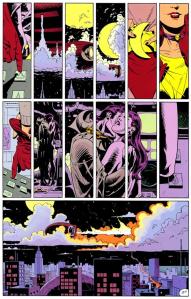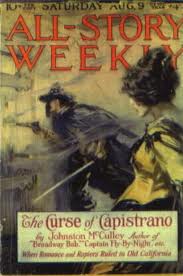So here’s my favorite gay superhero sex scene:
“I . . . placed my hands on his face. . . With one palm over his forehead and the other palm over his nose and mouth, I looked into those deep, dark pupils and saw the way he used to look at me when he was Dark Hero, when I didn’t know. Goran took my hand off his mouth and held it. He raised it to his mouth, placed his warm lips in the middle of my palm and kissed it. . . . I reached my arms around Goran, pulled him in, and our lips met.”
I know, pretty tame stuff, definitely not a passage from Unmasked: Erotic Tales of Gay Superheroes. It’s from Perry Moore’s 2007 Hero, and look how it echoes Zorro from one of the first superhero novels ever written:
“He grasped one of her hands, and before she guessed his intention, had bent forward, raised the bottom of his mask, and pressed his lips to its pink, moist palm.”
Johnston McCulley tells us Zorro is motivated by government persecution of monks and natives, but he and his alter ego Don Diego spends more effort seducing his future wife. Moore’s hero masturbates to online porn of wide-nippled Uberman (the one page I mumbled over when reading aloud to my kids), but he doesn’t find real intimacy until he and the better half of his dynamic duo have shared secret identities. The novel’s most touching scene takes place not in bed but during a picnic lunch in a public park, with both heroes fully clothed but unmasked. Zorro, however, likes to keep his mask on:
“The moment I donned cloak and mask . . . My body straightened, new blood seemed to course through my veins, my voice grew strong and firm, fire came to me! And the moment I removed cloak and mask I was the languid Don Diego again.”
That’s my favorite passage from all of superhero literature. It’s also one of the most thinly veiled descriptions of a penis I’ve ever read. For McCulley’s Zorro, a mask is a fetish. It literally makes him hard. Without it, he’s limp. It has a similar effect on women. Senorita Lolita is bored by the unmanly Don Diego, but she is titillated by his masked outlaw:
“And suddenly she was awakened by a touch on her arm, and sat up quickly, and then would have screamed except that a hand was crushed against her lips to prevent her. Before her stood a man whose body was enveloped in a long cloak, and whose face was covered with a black mask so that she could see nothing of his features except his glittering eyes.”
This is the erotic subtext to a surprising range of superhero tales. The hero dons his manly disguise not fight crime and uphold justice, but to woo the girl.
Before McCulley published The Curse of Capistrano in 1919 (it was renamed The Mark of Zorro after the Douglass Fairbanks film adaptation the following year), Zorro’s predecessors (Spring-Heeled Jack, Scarlet Pimpernel, Gray Seal) established unmasking as the ultimate act of intimacy between a superhero and his love interest. Though those earlier writers wedded the mask and the marriage bed, McCulley takes the striptease to new extremes. Zorro “tore off his mask” only after he gets Lolita to reveal “her true heart” and agree to “have offspring.” Don Diego’s seduction is complete. Although Lolita “would rather have you Senor Zorro than the old Don Diego,” she now loves “both of them.” Don Diego can retire both his mask and his “languid ways.” People “will say marriage made a man of me!”
This all sounds quaintly old-fashioned, but the same plot turns today’s superheroes. Alan Moore (no relation to Perry) makes Don Diego’s languid impotence explicit in Watchmen. Daniel Dreiberg can’t keep himself strong and hard (“Oh Laurie, I’m so sorry, it isn’t you, it’s just . . .”) until he’s dressed as Nite Owl (“Did the costumes make it good?”).

Or take a more recent look at the 2010 film Kick-Ass. (Forgive me, Mark Millar and John Romita, Jr., but I’ve not read your 2008 comic book yet.) Dave, the mild-mannered hero, can’t get the girl. Why? Because she thinks he’s gay. Fairbanks played the effeminate Don Diego to similar effect. Katie, however, thinks this new superhero Kick-Ass is pretty damn sexy. Where does Dave reveal himself to her? Her bedroom. What happens afterwards? The obvious. In fact, now Katie can’t keep her hands off Dave, and next they’re fornicating in back alleys too.
McCulley might have blushed at the R-rated sequence, but his Lolita had similar adventures in mind for her boy wonder. Like Don Diego, Dave and Dan are nothing without their masks. That’s why I prefer Moore’s hero, a gay man who never hides in his closet. Dark Hero’s alter ego is no languid Clark Kent either. By making the hero and his love interest gay, Moore unmasks the homophobic subtext and sets the superhero genre straight.




This reminds me: in THE EROTIC ADVENTURES OF ZORRO, one of the last sexploition movies, Zorro’s public identity is very, VERY over-the-top gay, which serves to ensure that he won’t be identified as the über-macho outlaw:
http://www.youtube.com/watch?v=1e9zJB-vqbw&t=4m4s
Regarding Nite Owl in Watchmen, I thought Alan Moore made it pretty clear that it wasn’t simply wearing the costume, it was wearing the costume and doing superhero stuff (piloting his ridiculous Owl Ship and rescuing people) that was the real turn-on for him.
Also, no mention of Zorro, The Gay Blade?
Yes, The Gay Blade, what a crazy example–there one of the two hero identities IS gay, which reverses the trend.
No masks, but if you want to talk about a hero who doesn’t know how incredibly gay he is, John Carter of Barsoom.
-I eventually concluded that “clean-limbed fighting man” meant, not unscarred, but no body hair. Burroughs wrote romance like he’d never kissed a girl -which would be a shock to his wife and children, I’m sure- and all the romance in those books is only a McGuffin to drive the adventure with the women interchangeable non-entities.
The real relationships in the stories are between men; no exceptions save Chessmen of Mars, where Tara being the main protagonist gave Burroughs little choice but to do better.
Yeah, when you open up the homosocial analysis, almost the entire genre applies.
I suppose some of that applies to Doc Savage, but not nearly as intensely, IMO, and my knowledge of the genre of the period gets a little random after that.